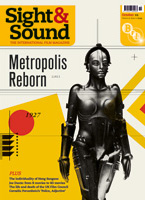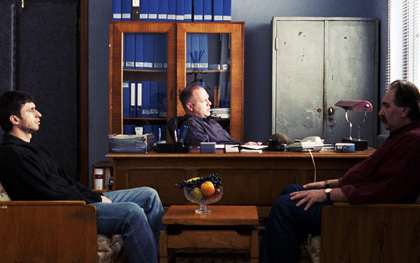Primary navigation

Romania 2009

Reviewed by Philip Kemp
Our synopses give away the plot in full, including surprise twists.
Vaslui, northeast Romania. Cristi, an undercover cop, is following a student, Victor, who’s been seen smoking pot near a school. Back at police headquarters Cristi goes to see the prosecutor. Cristi’s boss, Captain Anghelache, is pushing for a sting operation to resolve the case, but Cristi is reluctant to cooperate as he doesn’t want to see Victor jailed for such a trivial offence. The prosecutor says Cristi must act in accordance with the law. Cristi watches Victor smoking pot with his girlfriend and his friend Alex, who has informed on him. Suspicious of Alex, Cristi follows him home and watches the house. He sees Victor’s girlfriend arrive; when she leaves he follows her to find out where she lives.
Cristi discovers that Alex’s father is a rich industrialist, that Victor’s older brother travels to Italy a lot and that the girlfriend’s brother has a police record. He meets Alex in a café and asks whether Victor’s brother may be supplying the drugs; Alex is evasive. At home, Cristi and his wife Anca discuss the words of a pop song. The next day he watches Alex’s house again, then returns to police HQ where his colleague Nelu tells him the captain is looking for him. Avoiding the captain, Cristi asks colleagues to provide him with background information. Armed with this he completes his report, though Anca tells him he’s made a grammatical mistake in it.
The next day Cristi and Nelu are called to see the captain. Cristi refuses to make the sting, saying he doesn’t want Victor on his conscience. Captain Anghelache sends for a dictionary and makes Cristi look up ‘conscience’, ‘law’, ‘moral’ and ‘police’. On the strength of these definitions, he coerces Cristi into cooperating. Cristi starts to set up the sting operation.
Corneliu Porumboiu’s second feature may well be – on the surface at least – the most undramatic cop movie ever filmed. No guns, no car chases (indeed virtually no cars), no arrests, not a hint of violence. For long dialogue-free stretches the camera tracks a man following someone on foot through featureless streets, or standing for hours watching the gates of a house. By way of a climax we get a 20-minute scene of three men sitting in an office consulting a dictionary.
Put like that, Police, Adjective might seem to offer a classic instance of the strain of ‘slow cinema’ whose merits or otherwise have been much debated in the last few issues of Sight & Sound – films that, as Nick James put it in his April editorial, “demand great swathes of our precious time to achieve quite fleeting and slender aesthetic and political effects”. Certainly there’s little here to detain Michael Bay fans, but anyone who appreciates bone-dry deadpan humour and intelligently subversive film-making will find plenty to raise their interest – if not their adrenaline level.
Rarely can police work have been portrayed in a more resolutely unglamorous light. The action takes place not in the Romanian capital but in Vaslui, a provincial town in the northeast. (This, Porumboiu’s hometown, was also the venue for his debut feature 12.08 East of Bucharest, and is apparently where he plans to continue setting his films – the Shane Meadows, as it were, of Romania.) Cristi, the undercover cop following up a suspected minor drugs offence, works out of a cramped office in a squat, graceless building where the corridors are painted drab hospital green and the furniture consists of cheap plywood desks and rackety metal cupboards. He’s a morose figure whose relations with his colleagues seem for the most part soured by a weary impatience on both sides.
Yet for all his moodiness Cristi cuts a sympathetic figure as he strives to make sense of an essentially meaningless world. Two discussions with his wife Anca focus on the trivial use and misuse of language. In one, Cristi objects that the inane pop song she keeps playing (“What would the sea be without the sun?”) makes no sense; Anca baffles him by saying it’s an “anaphora”, which in fact it isn’t. Later she points out a grammatical error in his police report, since two words that used to be separate have now been elided by order of the Romanian Academy. (“You mean there are people who analyse things like that?” Cristi marvels. “They’re crazy.”)
These linguistic exchanges foreshadow the key scene where Cristi’s boss Captain Anghelache overcomes Cristi’s objections to busting a teenager for smoking the occasional spliff – which could entail a lengthy jail sentence – by forcing him to look up definitions (‘conscience’, ‘law’, ‘moral’) in a dictionary. It’s all the more effective for being downplayed: Anghelache doesn’t hector or bully, but calmly pushes Cristi into a logical cul-de-sac. This quietly insidious handling of the scene allows us to reflect that, from a certain angle, Anghelache is right. Cristi’s instincts, being liberal, may invite our sympathies, but he’s nonetheless trying to bend the law to suit his own predilections.
There’s also a hint that Cristi is being swayed by class prejudice. Victor, the suspect, is the son of dairy workers, while his treacherous friend Alex, who’s informing on him, is the son of a rich industrialist. What initially seems like a simple question of right and wrong, liberalism versus oppression, turns on closer examination into a moral quagmire. Near the position Cristi takes up to observe Alex’s house are some abandoned roadworks, and when a shop assistant who’s spotted him hanging about asks what he’s doing, he tells her he’s “keeping an eye on the hole outside”. As indeed he is.
The Happiest Girl in the World reviewed by Michael Brooke (June 2010)
Where there’s pomp…: Tales from the Golden Age’s Cristian Mungiu interviewed by Nick Bradshaw (November 2009)
Eastern promise: Nick Roddick on Romanian cinema’s new wave (October 2007)
4 Months, 3 Weeks and 2 Days reviewed by Ben Walters (Film of the Month, January 2008)
California Dreamin’ (Endless) reviewed by Kieron Corless (April 2008)
The Death of Mr Lazarescu reviewed by Michael Brooke (August 2006)